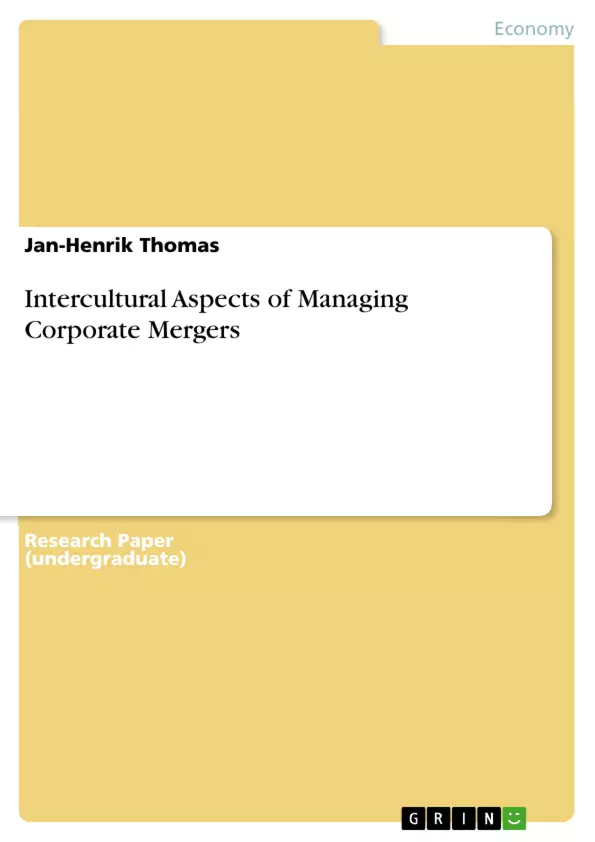The following term paper deals with the topic of managing intercultural aspects in corporate mergers and acquisitions. It focuses on the intercultural aspects of human resistance to change in the PMI phase of corporate mergers.
„Those who underestimate or ignore the human factor do so at their peril.“ Over the last two decades mergers & acquisitions are increasingly used to protect and to strengthen the market positions of companies. Due to the continuing globalization of markets, mergers and acquisitions have become a part of daily business. To survive in high competitive markets evermore companies use the possibility to merge or acquire a competitor because this is seen as a relatively fast and efficient method of expanding in new markets and of implementing new technology. In a highly flexible market environment, as it is nowadays, organisations have to be efficient, profitable, future orientated and adaptable to the fast development of the global economy. Otherwise they would not have the option to play a dominant and leading role in their markets. Therefore companies depended on a successful M&A process which is manly influenced by the capabilities and skills of managing and implementing the change effectively, although this is a major challenge. As figure 1 shows, companies are highly aware of financial objectives like the increase of sales or the reduction of costs. It is often the case that companies’ financial prospects seem to be excessively high, which in the end leads to multiple missed objectives and even to entirely failed PMIs. Whereas some cases can be explained by financial or market based reasons, there is noticeable amount based on the neglect of human resource issues. Many companies are aware of these facts and thus conduct well structured analysis to satisfy the needs of their employees and at the same time to reach their strategic and financial goals. Nevertheless, they tend to ignore the “people issues” because these soft factors are difficult to measure quantitatively. As various companies gladly give lip services like “our employees are the most important resource”, divers studies prove that these deliberations play a subordinated role in reality.
Inhaltsverzeichnis (Table of Contents)
- Delimitation of the paper
- Introduction
- Background and current situation
- Ambition of the paper
- The M&A process
- Definition of terms
- The typical M&A procedure
- Planning process
- The PMI process
- Reasons for the failure of corporate mergers
- Human resistance against changes and their effective treatment in the PMI process
- The relevance of communication and information exchange
- The significance of leadership and participation
- The critical role of the integration of different corporate cultures
- Further integration activities
- Conclusion
Zielsetzung und Themenschwerpunkte (Objectives and Key Themes)
This term paper aims to analyze the intercultural aspects of managing corporate mergers and acquisitions, particularly focusing on the human resistance to change during the post-merger integration (PMI) phase. The paper seeks to understand the challenges of integrating different corporate cultures and explore effective strategies to overcome resistance to change in a multicultural context.
- The importance of effective communication and information exchange during the PMI process.
- The role of leadership and employee participation in mitigating resistance to change.
- The significance of integrating different corporate cultures to ensure a successful merger.
- The challenges and opportunities of managing human resistance to change in a globalized business environment.
- The impact of cultural differences on the success of mergers and acquisitions.
Zusammenfassung der Kapitel (Chapter Summaries)
The paper begins by defining the scope and objectives of the study, focusing on the intercultural aspects of human resistance to change in the PMI phase of corporate mergers. It then provides an overview of the current state of mergers and acquisitions, emphasizing the importance of integrating different corporate cultures to achieve successful outcomes. The paper discusses the typical M&A procedure, including the planning process and the PMI process, highlighting the challenges of managing human resistance to change. Furthermore, it examines the crucial role of communication and information exchange in facilitating a smooth integration, as well as the significance of leadership and participation in addressing resistance to change. The paper emphasizes the importance of integrating different corporate cultures to create a cohesive and unified organizational structure after a merger.
Schlüsselwörter (Keywords)
The paper focuses on the following key themes: corporate mergers, acquisitions, post-merger integration, intercultural communication, human resistance to change, organizational culture, leadership, and global business environment. It explores the practical challenges and opportunities of managing these aspects in a multinational context.
Frequently Asked Questions
Why do many corporate mergers fail?
Failure is often caused by neglecting the "human factor," such as cultural clashes, poor communication, and resistance to change among employees.
What is the PMI phase in a merger?
PMI stands for Post-Merger Integration. It is the phase where the two companies actually combine their operations, cultures, and staff after the deal is legally closed.
How can communication reduce resistance to change?
Effective and transparent communication helps reduce uncertainty and fear, which are the main drivers of employee resistance during a merger.
What role does leadership play in M&A?
Strong leadership is critical for managing the integration process, motivating staff, and bridging the gap between different corporate cultures.
Why are "soft factors" difficult to manage in mergers?
Soft factors like organizational culture and employee morale are hard to measure quantitatively, leading many managers to focus solely on financial objectives instead.
- Citar trabajo
- Jan-Henrik Thomas (Autor), 2009, Intercultural Aspects of Managing Corporate Mergers, Múnich, GRIN Verlag, https://www.grin.com/document/143272



